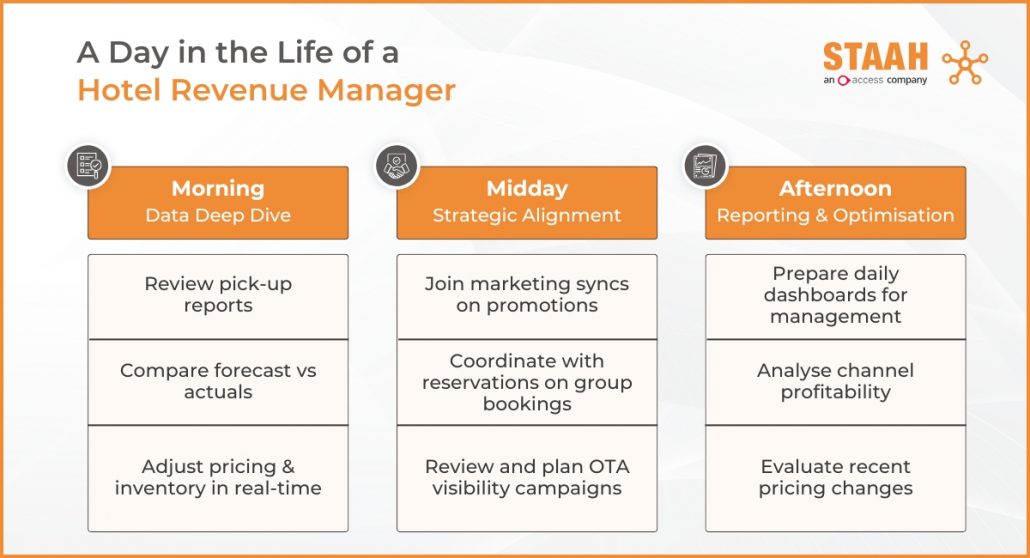Revenue is never accidental. In hospitality, every dollar earned reflects smart planning, sharp forecasting, and responsive pricing, all driven by the Hotel Revenue Manager.
This role has evolved from being spreadsheet-heavy to being one of the most strategic positions in hospitality. The modern Revenue Manager blends analytical skills, commercial instinct, and technology to answer a simple question daily: How do we maximise revenue without compromising guest experience?
Let’s explore what makes this role so critical and how aspiring professionals can succeed in it.
Why Is the Revenue Manager So Important?
At a time when hotels are managing multiple booking channels, facing price wars on online travel agents (OTAs), and dealing with fluctuating demand, the Revenue Manager becomes the nerve centre for strategy.
Here’s what makes their role indispensable:
- They ensure pricing reflects real-time demand and market shifts
- They make data-informed decisions that affect every department including sales, marketing, reservations, and even operations
- They bridge tech and strategy, often being the power users of hotel tech systems
Understanding the Responsibilities of a Revenue Manager
The Revenue Manager is responsible for developing and executing strategies that increase a hotel’s total revenue, not just from rooms, but often across F&B, meeting spaces, and ancillaries.
Core responsibilities include:
- Forecasting demand using historical data, market trends, and events
- Dynamic pricing by adjusting rates in real-time to maximise occupancy and revenue
- Managing distribution channels (OTAs, direct booking, wholesalers) to ensure profitability across all
- Analysing booking patterns, pace reports, and pickup trends
- Competitor benchmarking to ensure rate positioning is competitive
- Revenue reporting and identifying gaps or opportunities in performance
- Cross-functional collaboration with sales, marketing, and operations to align goals
Unlike some roles that are reactive, revenue management is proactive and predictive, and the quality of this strategy determines hotel profitability.

A Closer Look: A Day in the Life of a Revenue Manager
Let’s demystify the daily routine. While every property is different, a typical day might look like this:
 Each decision, whether micro (a $5 price shift) or macro (a new package strategy), contributes to overall business health.
Each decision, whether micro (a $5 price shift) or macro (a new package strategy), contributes to overall business health.
What Skills Make an Excellent Revenue Manager?
This isn’t a role for number-crunchers alone, it’s about transforming data into insight, and insight into strategy. Strong Revenue Managers typically possess:
- Analytical skills – to interpret large data sets and spot patterns
- Commercial acumen – to balance profitability with competitive positioning
- Communication skills – to influence other departments with their insights
- Adaptability – to act quickly when market conditions change
- Tech literacy – to manage multiple systems and dashboards efficiently
The Technology That Powers Smart Revenue Management
A great Hotel Revenue Manager is only as effective as the tools they use. With the right tech stack, they can work faster, smarter, and more strategically. Here’s what a future-ready revenue toolkit looks like and how STAAH supports each layer:
1) Channel Manager
Managing multiple OTAs manually is time-consuming and error-prone. A channel manager ensures your rates and availability are consistent across all platforms.
STAAH Tip: With STAAH Max Channel Manager, Revenue Managers gain real-time control, automated updates, and seamless multi-channel distribution, eliminating manual errors and saving hours every week.
From rate parity to real-time control, see how a Channel Manager empowers Revenue Managers to work smarter. Click here to learn more.
2) Booking Engine
Your hotel website should be your most profitable channel. A booking engine helps you convert visitors into bookers by offering a seamless and mobile-friendly reservation process.
STAAH Tip: STAAH SwiftBook is designed for conversion from promo code support to upsell features, it helps you drive more direct bookings.
3) Business Intelligence & Reporting
Data is your roadmap. Having the right reporting tools enables you to monitor performance, spot trends, and make fast, data-backed decisions.
STAAH Tip: STAAH Reports gives you real-time dashboards and detailed reports, empowering Revenue Managers to make smart, strategic calls every day.
4) Rate Shopping Tools
To stay competitive, you need to know what your competitors are charging. Rate shopping tools help benchmark and guide pricing strategy.
STAAH Tip: With RateStalk by STAAH, you can easily track competitor pricing and adjust rates accordingly, all from a single platform.
5) Promotions & Campaign Management
Targeted promotions are vital for filling demand gaps. Managing them efficiently across OTAs ensures maximum visibility and results.
STAAH Tip: OTA Promotions on STAAH platform simplifies campaign setup and performance tracking, helping you respond to market needs faster and more effectively.

How to Become a Revenue Manager
If you’re aiming to grow into this role, here’s what you need to focus on:
- Educational foundation: A degree in hospitality, finance, business, or economics
- Frontline experience: Exposure to front office, reservations, or sales helps
- Upskilling: Courses in revenue management (e.g., from HSMAI, Cornell, STR)
- Hands-on with tech: Familiarity with channel managers, Revenue Management System (RMS), and analytics tools
- Stay updated: Read market trend reports, attend industry webinars, and join revenue managers communities
Practical Tips to Excel in Revenue Management
- Be curious: Don’t settle for top-line numbers. Ask “why” and “what next?”
- Speak the language of business: Connect your strategy to revenue growth
- Collaborate across departments: The best strategies are cross-functional
- Fail fast, learn faster: Not every rate strategy works, but every miss teaches something
- Leverage automation: Free your time from manual tasks using platforms like STAAH
- Always optimise: Whether it’s rate plans, channel mix, or conversion flows
With the right tools in place, Revenue Managers can move from operational firefighting to high-level strategy, shaping the revenue future of the property.

The Revenue Manager for a hotel is not just a data analyst or a rate adjuster, they’re a strategic leader, driving profitability through insight, precision, and action. Their impact spans far beyond spreadsheets.
With the right mindset, skillset, and toolset, they can transform a hotel’s commercial performance and set the pace in a competitive market. Ready to empower your revenue team? Learn how STAAH can make your revenue management smarter: www.staah.com

